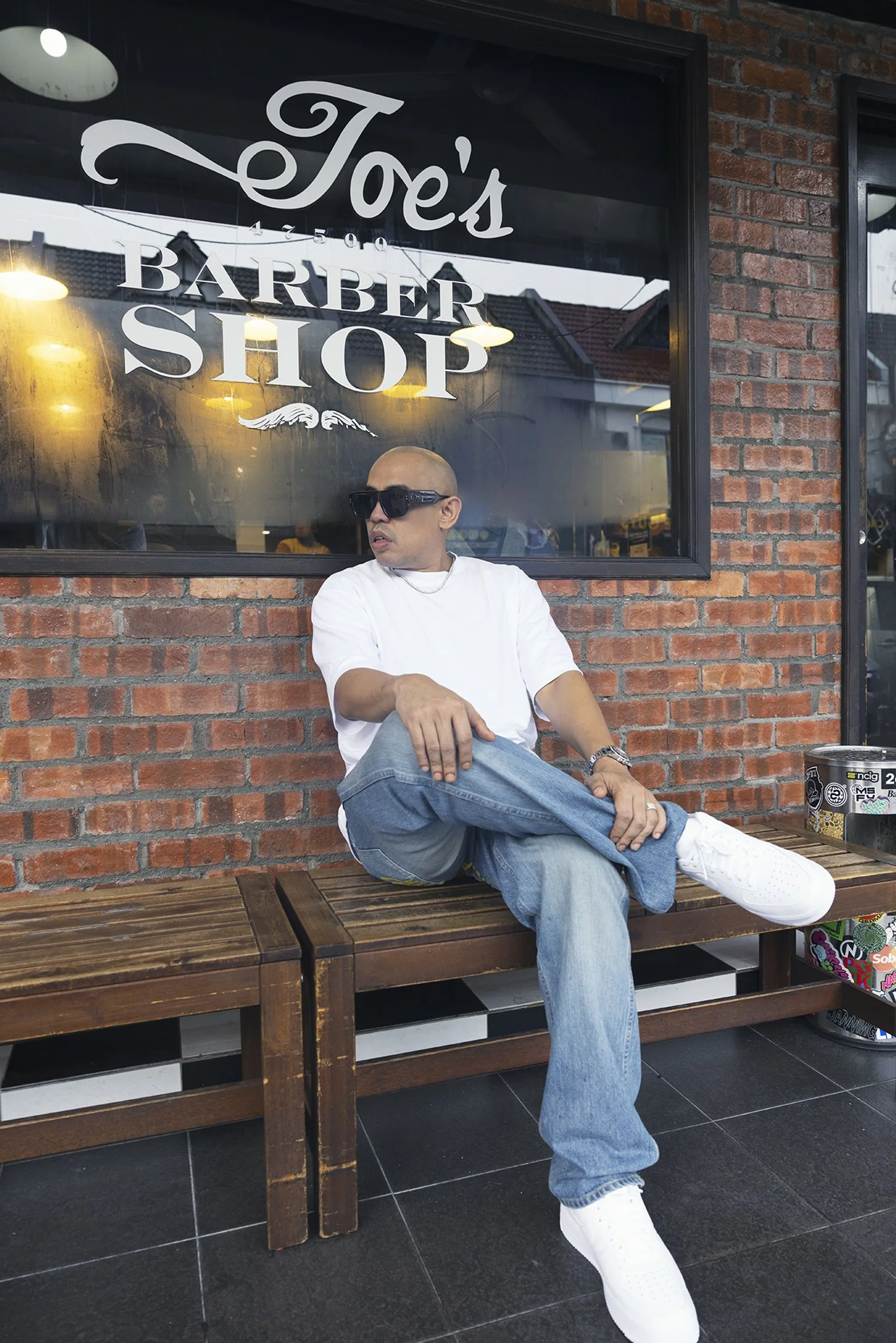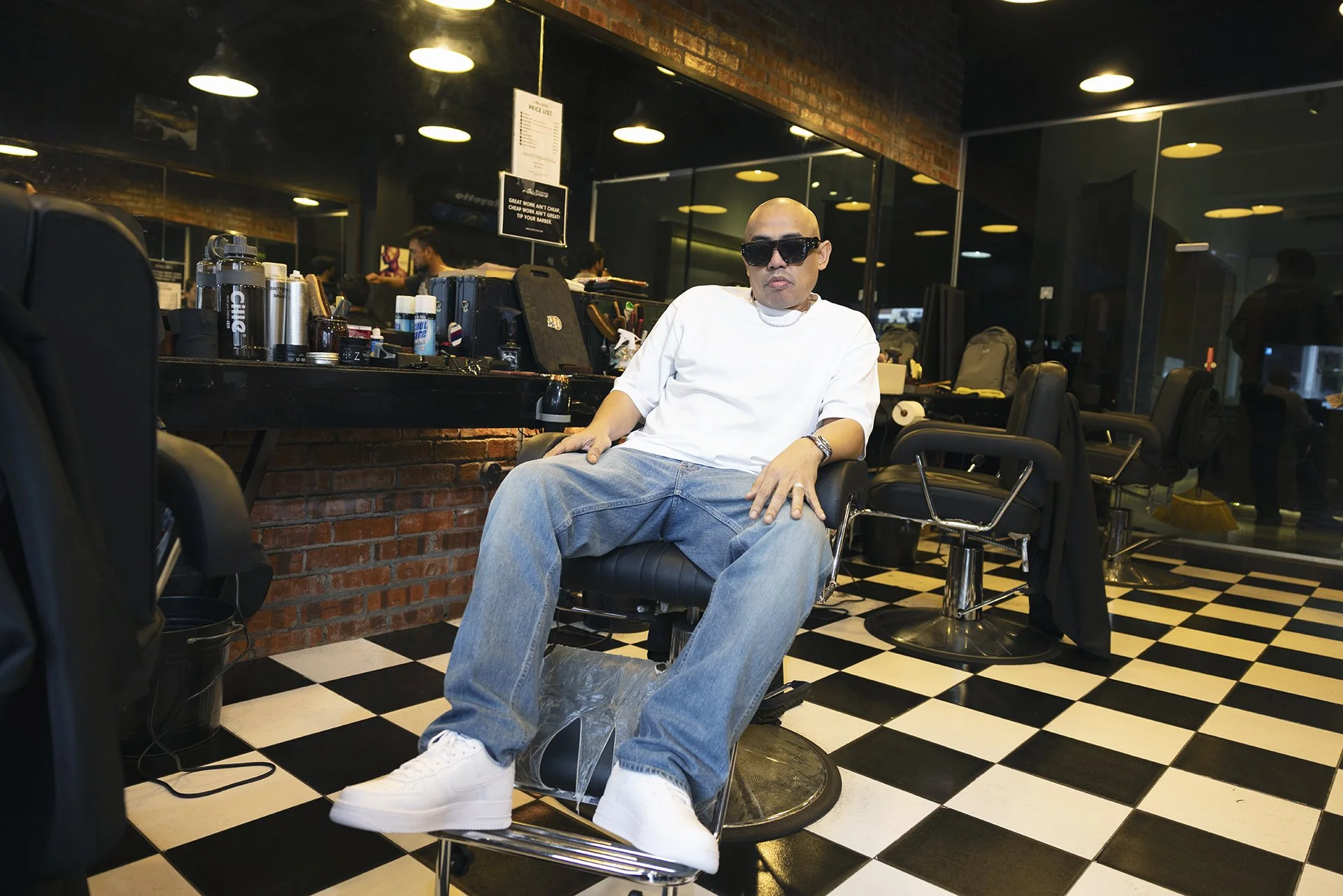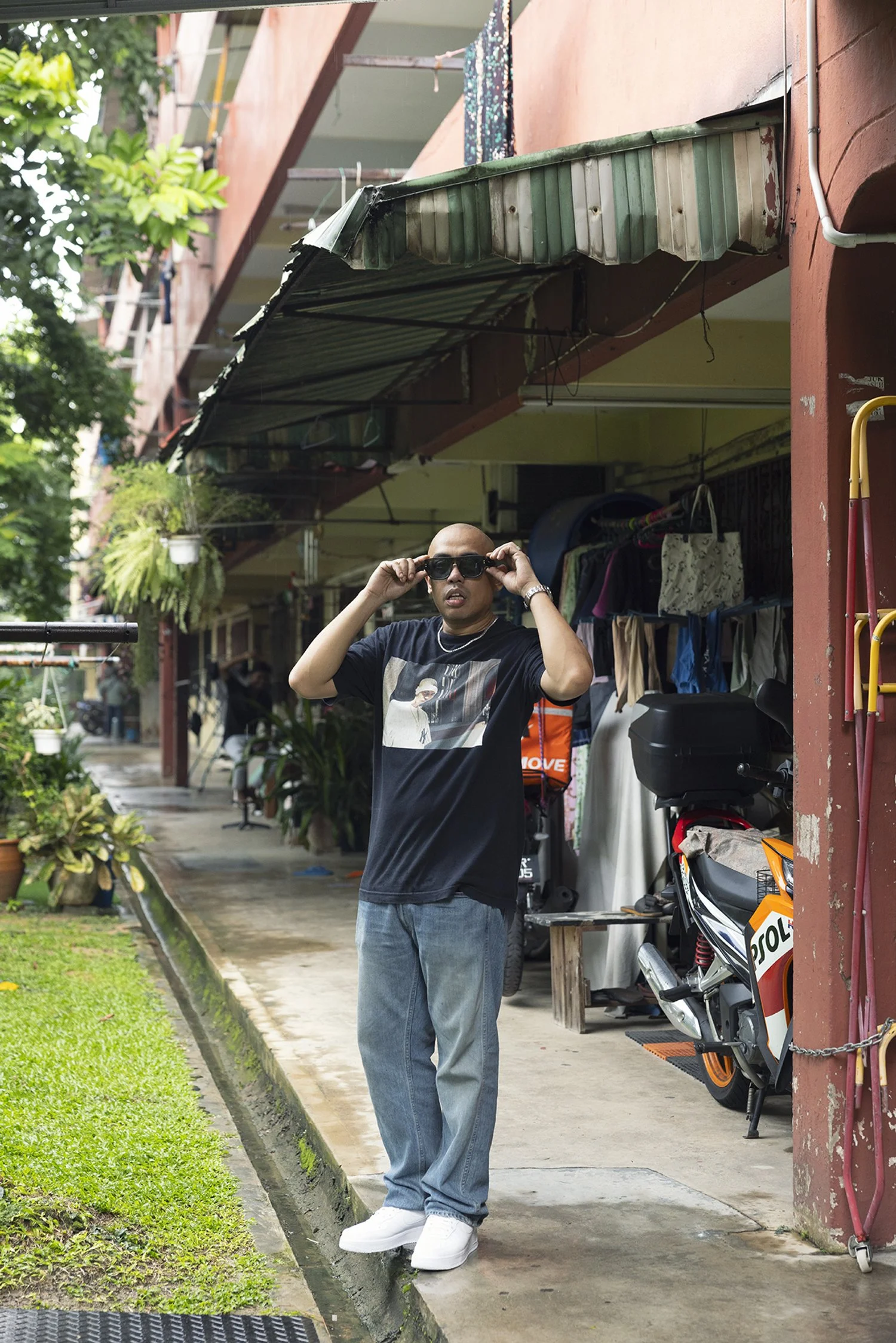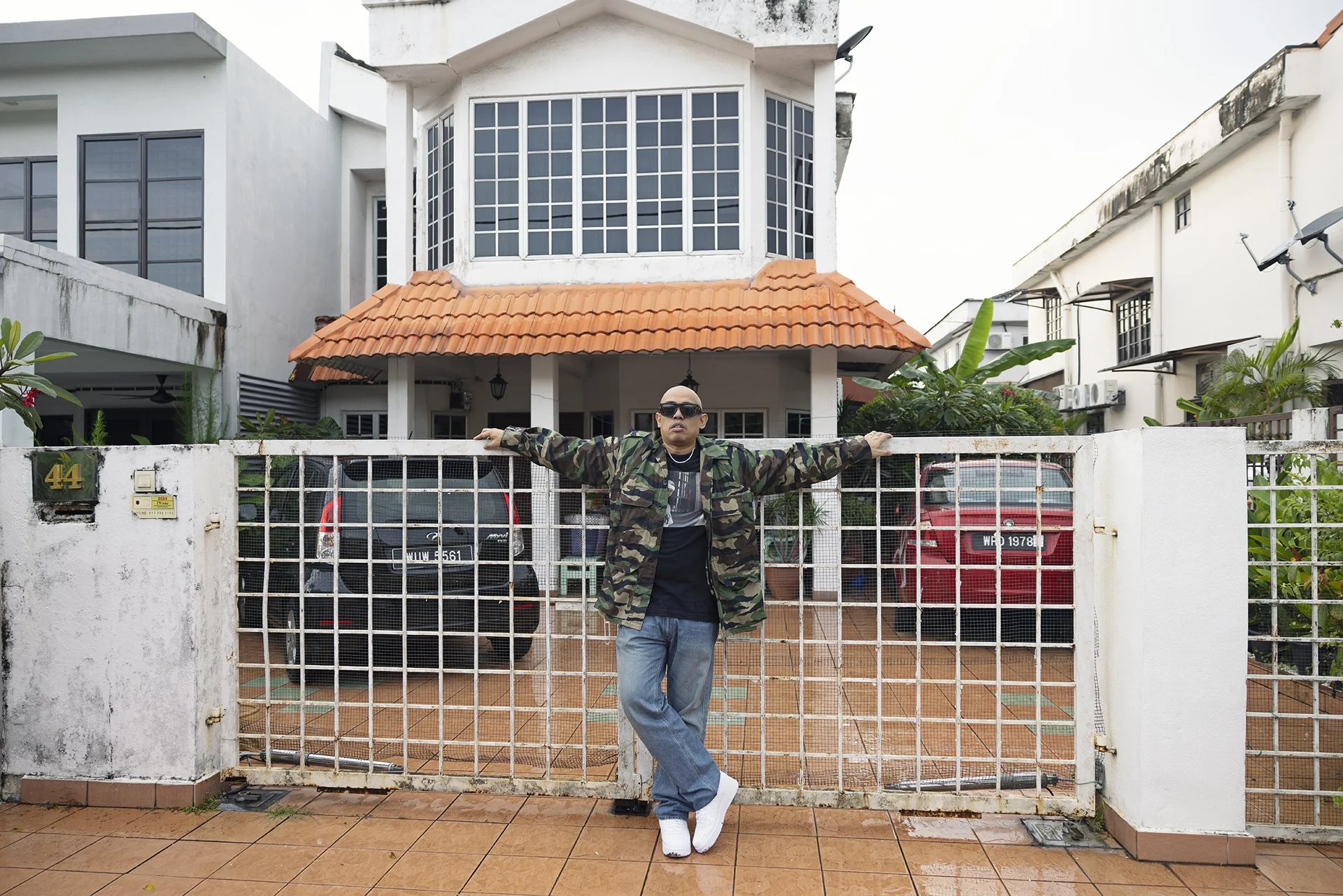
joe flizzow
From “Too Phat” to Def Jam Southeast Asia CEO. The hustlenomics of a Malaysian Hip-Hop pioneer
Text & Photo: Atsuko Tanaka
We delve into the life of Joe Flizzow, a legendary Malaysian rapper and a pivotal figure in the Southeast Asian hip-hop scene. Born in Kuala Lumpur and raised in the diverse environment of London, Joe discovered hip-hop through his uncle's music collection. He later formed the iconic hip-hop duo "Too Phat" with his friend Malique, signing with the label "Positive Tone" and releasing five albums. Since then, while continuing his solo career, Joe has ventured into various industries, including running a barbershop and serving as the CEO of Def Jam Southeast Asia. In our interview, we discuss his rise to fame, the challenges he has faced, and his many triumphs, including his successful business ventures.
-Can you tell me what kind of environment you grew up in?
I was born in Kuala Lumpur, and when I was 2 years old, we moved to London because my dad, who was a journalist, got a job with the BBC. We lived in an area called Glenhill Close, Finchley and I had a very colorful and diverse childhood with kids from different races. My mom wanted to ensure I knew our language, so she played a lot of Malay songs. This made me enjoy singing and performing in front of people, like my mother’s friends who visited. Then I returned to KL when I was 7.
- How did you get into hip-hop?
It started with my uncle's CD and cassette tape collection. He was a music producer. What initially attracted me to hip-hop was the album covers. I think it was LL Cool J’s album “Walking With A Panther” and the cover caught my attention and got me curious. Then I heard the music, I fell in love with it. Around the age of 13, I got “The Chronic” by Dr. Dre and memorized every word of his songs and also Snoop and Nas’ songs too, amongst other artists.
-Then you decided to become a rapper?
It was never really a goal, I just loved rapping and performing. But when I was 17 or 18, my best friend Christopher Kung, who enrolled in a sound engineering school SAE called me one day and said he needed to record someone for his assignment. So I went in with my friends Malique and Kevin Felix and we recorded demos. We recorded another demo the next week. Then the cassette got copied and copied, and it sort of went viral for that time.
-That’s cool. What year was it?
It was probably late '97 or early '98. Then we got a call from a promoter who heard our demo and invited us to perform. We were actually at a cyber cafe on the same street, maybe the next block, when we got the call, and we decided on our group name “Too Phat”. The name was inspired from the skaters that were skating that street that would yell ‘phat’ everytime they landed a trick.
-So this street has your history.
Yes, so when this place became available, I immediately booked it to open a barbershop because it holds significant meaning to me. This barbershop is more than just a business, every time I come here, I'm reminded of my humble beginnings. Back in the day, there were record stores in this neighborhood that brought the community together. Since they're gone, I feel like this barbershop is a perfect spot where you provide a service to the neighborhood, and at the same time, people can listen to hip-hop. Actually, I got inspired from Frank’s Chop Shop in NY. I visited there, met the owner Mike, and got his blessing to open up a similar looking barbershop in Malaysia.
- Right, I see the resemblance to the Chop Shop for sure.
Yes that's right. Actually, we also have a barbershop cipher show that we shoot here called “16 Baris”. We shot the first two seasons here in Subang but the production is bigger now, so we’re doing it at another shop which is much larger.
- How many branches do you have now?
I opened this barbershop in 2015, and now we have 27. It’s a franchise, so I don't own all of them, I own about ten. Many of my barbers are inner-city kids with little education, so we teach them skills here. We also have a Barber School Academy, the first to be recognized by the Malaysian government. If someone works here for a few years and wants to open a barbershop, they can, and we don't charge them a franchise fee. They become a partner with us. That's how we grew so quickly.



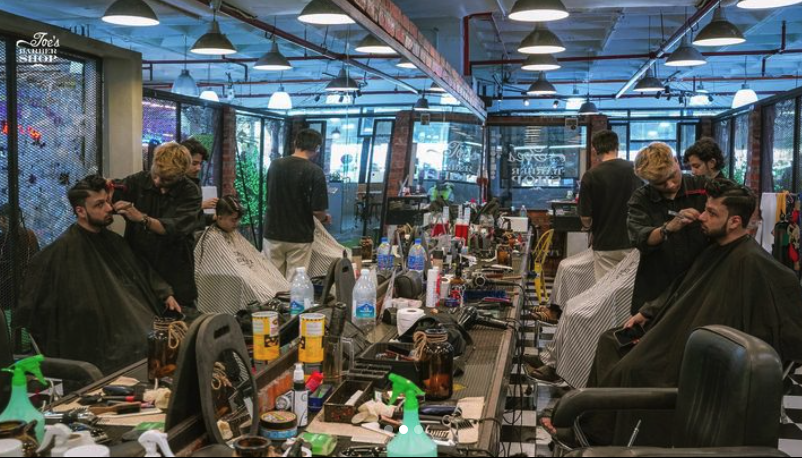
-Cool. So back to your story, what happened when you did your first gig?
It was good. I remember it was a super hot day, and I wore a maybe fake baby blue Fubu jacket, baggy jeans and Timberland boots. I was sweating heavily but thought I was the coolest guy in the world. This event was significant in hip hop scene in Malaysia because it was the first hip-hop gig in a long time. We were probably the only group that had never performed, but there was excitement because our demo was circulating, and people wanted to hear our songs. During the show, there was a guy banging on the stage, screaming he wanted to sign me. I told him to let me finish my set first.
-And then you guys started making more music?
We did underground gigs for the first six months and then started recording more songs, eventually making an album. The guy who wanted to sign us at the show was a producer, but we wanted to take our time, so we turned it down. Eventually, we were managed by the gig promoter, which turned out to be a blessing.
- When did you guys release your first album “Whuttadilly”.?
In '99. The producers that helped the albums production, Illegal and G Soul were previously part of a legendary group from the '90s called “Naughtiest Maximus”. They saw our potential and invited us to their studio. Much of the production were done by them, but since we did the album in full English, not in Malay, it was hard to find a label. But the guy who wanted to sign us from the first gig still wanted to sign us. The label was called “Positive Tone” and they were the first Malaysian label to invest in urban acts. So we signed with them and released our album. We put out four albums and one compilation album, until the group ended in 2007.
- And then you went solo?
Yes, but I didn’t release my solo album until 2009. The 2 years was a tough time for me, coming out of a successful duo and then suddenly everything stopped. No one wanted to book me as “one half of a duo,” so I had to figure out my next move. I went to Thailand because it was becoming a hub for Asian hip-hop and built friendships with the Bangkok invaders “Thaitanium” and many more people from the Thai hip-hop scene.
-How did it turn out?
The first few trips to Bangkok definitely gave me a sense of hope, the belief that I could do business from other angles, such as events promotions, clothing lines and other stuff. One of the things Titanium did well was managing DJs and events, so when I came back to Malaysia, I did the same. Since I used to party a lot, I knew all the club owners, so I asked them if I could manage their clubs on nights that weren't busy. I brought in DJs, sometimes from overseas, and shared them with other Southeast Asian promoters to give the DJs a tour. We would eventually do many tours for US DJs with our Thai counterparts and this helped all parties put together tours easier as flight costs were shared and they could do more cities when on tour.
-I see. What did you learn from those experiences?
One thing I noticed was that popular hip-hop songs among us weren't being played in the clubs. Although Too Phat was a huge success in Malaysia, when it came to the Malays songs it was still rapped in a very 'formal' form of delivery in the language. I set to change that. I decided to break the mold once again by abandoning the traditional style that was synonymous with my earlier work and rapped with heavily infused street lingos. With my “President” album I had a song called “Do It, Duit” which did that and when it was time for my second album “Havoc” to be released, I would say we laid down the foundations to how rap is performed now.
-So, besides being an artist, you run barbershops. What other businesses do you do?
I'm the CEO of Def Jam Southeast Asia. We have offices in Vietnam, Thailand, Indonesia, Malaysia, Singapore, and the Philippines. We started with six artists, but now we have about 30 artists in six countries. One of our efforts is to function not only as a label, but also as a distribution company. This allows artists who want to be entrepreneurs to do what they want to do. By the way, we have an artist from Singapore called Alyph is now based in Malaysia, but he recently had a number one hit song in Indonesia. Even though the languages are different in the countries, I think it's not impossible to become the voice of hip-hop in Southeast Asia and eventually a global superstar.
-Awesome. If you have advice for younger people who want to be successful like you, what would you tell them?
The most important thing is to dream big. Be passionate and stick to it, because passion will be food for your soul. Then set your goals as high as possible and make a plan to achieve them. And work hard. That way you reduce the risk of failure. But even if you fail, don't accept it as defeat, take it as a lesson and move forward.
- Last question, what does hip-hop mean to you?
Everything. It’s the way I walk, the way I breath, the way I think, the way I fight, the way I love. It’s what hip-hop is to me.
